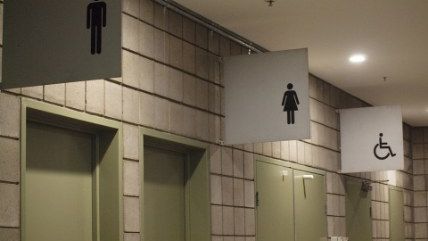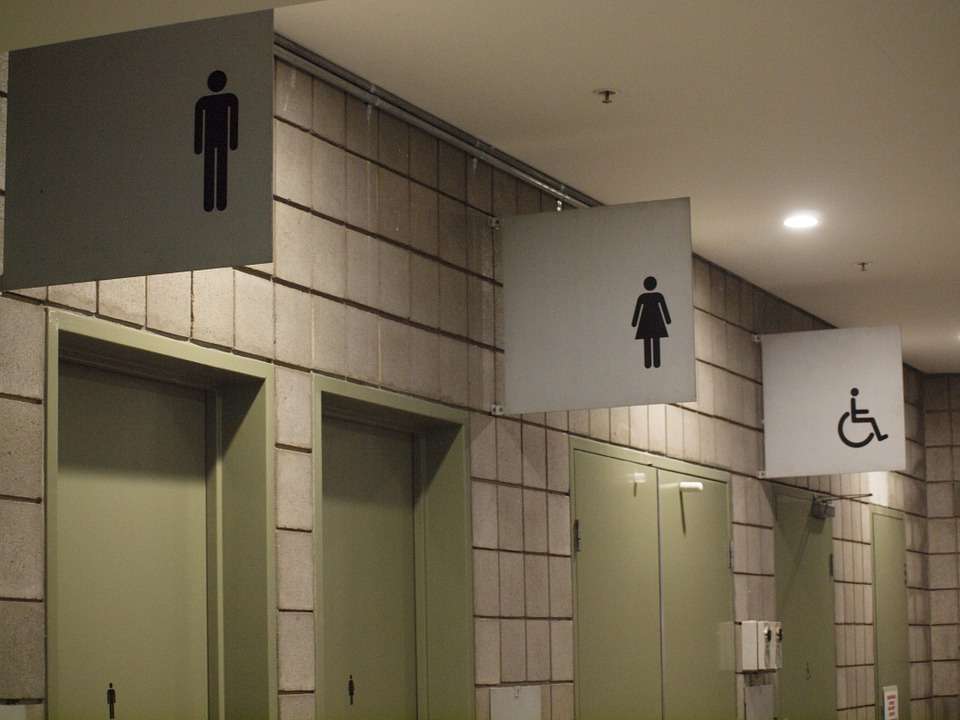Transgender Pronoun Policing Leads to Government-Mandated Speech
Will a requirement, by law, to refer to an individual as 'they,' hold up?


Sexual harassment workplace policies tend to revolve around telling people not to do things. Don't use sexist language when talking to people, don't post pictures of swimsuit models in your cubicle, don't smack people on the ass, don't tell a subordinate he or she has to put out in order to get a raise, et cetera, et cetera.
But as we move further into the realm of using federal and state laws to punish harassment against transgender people in the work environment, we are seeing government officials attempting to enforce demands that employers and workers must say certain things. Specifically, refusing to refer to a transgender person by the pronoun "he" or "she"—or other terms we're about to get into—can be considered harassment.
Elizabeth Nolan Brown wrote in December how New York City was ordering employers to make certain transgender employees are accommodated by the use of whatever pronoun they prefer upon the threat of fines for even isolated incidents. And to be clear, the pronoun choice doesn't have to consist of the typical "he" or "she," meaning that a transgender employee can demand to be called "ze" or other non-standard pronouns that could be confusing to even the most accommodating of employers and co-workers. So now anti-harassment enforcement may involve policing and requiring people to say certain things.
The consequences are now playing out at the Gresham-Barlow School District in Gresham, Oregon. The district has agreed to a $60,000 settlement over the way a transgender teacher, Leo Soell, has been treated. The Oregonian explains:
Soell identifies as neither male nor female and uses the pronoun they instead of he or she. But, Soell wrote, coworkers continuously called Soell "she," "lady" or "Miss Soell." Someone smeared Vaseline on Soell's cabinets, the complaint said, and another yelled insults in the school hallway. Others conspired to prevent Soell from using the school's lone gender-neutral bathroom, the complaint said.
A district investigation, which officials have declined to release, found no proof of harassment.
But Gresham-Barlow officials agreed to a settlement this month that compensates Soell for emotional damages. District leaders also agreed to add gender-neutral bathrooms to all schools, create clear policies about transgender teachers and host mandatory trainings for all Gresham principals, as well as Hall staff.
There are elements of what can be clearly identified as workplace harassment, if what Soell claims to have happened is true, and there is what appears to be hostility toward Soell in the workplace. But it's also clearly a situation that would confuse just about anybody. Soell doesn't identify as either gender, but after getting a mastectomy as a result of breast cancer decided to keep what appeared to be a masculine chest and legally change the name to Leo. This all suggests a desire to be referred to as a male, but Soell wanted to be called "they." Why change the name to Leo if Soell doesn't identify as male or female? Why change the name at all?
Maybe Soell just likes the name "Leo." Hey, if that's what Soell wants to do with Soell's body, more power to … them? Nope, I don't think I can do it. Pronoun agreement has nothing to do with gender identity. This example ends up becoming less and less about respecting Soell's personal life choices versus the need to keep language as a tool to help communicate with each other and not a field of metaphorical bear traps designed to trigger pain and punishment upon the unwary. It also creates a different sort of problem in an elementary school environment that is supposed to be teaching children correct grammar, including pronoun use. Can editors request a secular version of a religious exemption here?
Eugene Volokh wrote about the case over at the Washington Post today and considers the First Amendment implications. There is an implicit component of gender politics in Soell demanding not be referred to as either male or female, because Soell complains that language is not "inclusive" enough. If the government requires workers and employers to refer to Soell as "they," doesn't it potentially follow that they are being forced to carry forward an ideological message? Volokh argues:
[T]rying to force people to endorse a particular view on these questions by requiring them to use this highly conspicuous, nonstandard usage, I think, violates basic First Amendment principles. Drivers, the Supreme Court held in Wooley v. Maynard (1978), are entitled not to display "Live Free or Die" on their license plates — not to be "in effect require[d] … [to] use their private property as a 'mobile billboard' for the State's ideological message." They would likewise be free not to display "Language Should Be More Inclusive." And they should be free not to use words that "set[] off grammar alarms" that signal such an ideological message.
When it comes to the government acting as employer, dictating what employees may say at work, the First Amendment question necessarily becomes more complicated. Perhaps a government employer might be able to require employees on the job to use "they" or "ze" or "thee" or "dude" or "human" or "comrade" or whatever a co-worker prefers.
But Soell's complaint alleged that failure to use the terms was "harassment" and discrimination, which is forbidden in privately owned workplaces as well as governmental ones. The New York City guidance likewise applies to such privately owned workplaces. And when the government is acting as sovereign, telling us what we must or must not say on pain of coercively imposed legal liability, the First Amendment is at full force. That force, I think, should preclude government commands that we start using new words — or radical grammatical modifications of old, familiar words — that convey government-favored messages about gender identity or anything else.
If nothing else, this is a good reason it's a problem for the Department of Justice to stomp in and start ordering schools to treat transgender students in any one particular way. I suspect that even as culture grows more and more friendly toward transgender acceptance, this kind of mandated pronoun policing is going to prove to be untenable.
It will be a lawsuit generator, certainly. The Oregonian notes that part of the settlement was to pay Soell's out-of-pocket costs for the cancer treatment, allegedly because Soell's health insurance rejected it because Soell is transgender. That doesn't make a whole lot of sense, unless Soell decided on a double mastectomy to treat the cancer, but one wasn't truly medically necessary.
As we've seen, though, previously in the case of the gay couple who sought punishment against bakers who declined to make them a wedding cake, the way our justice systems approach "damages" heavily encourages massive exaggerations about the harms done in order to increase the size of settlements (one woman in that couple said being declined as a customer "made her feel as if God made a mistake when He made her"). That the use of a wrong pronoun could possibly set off a legal bomb is going to be a serious problem.


Show Comments (212)